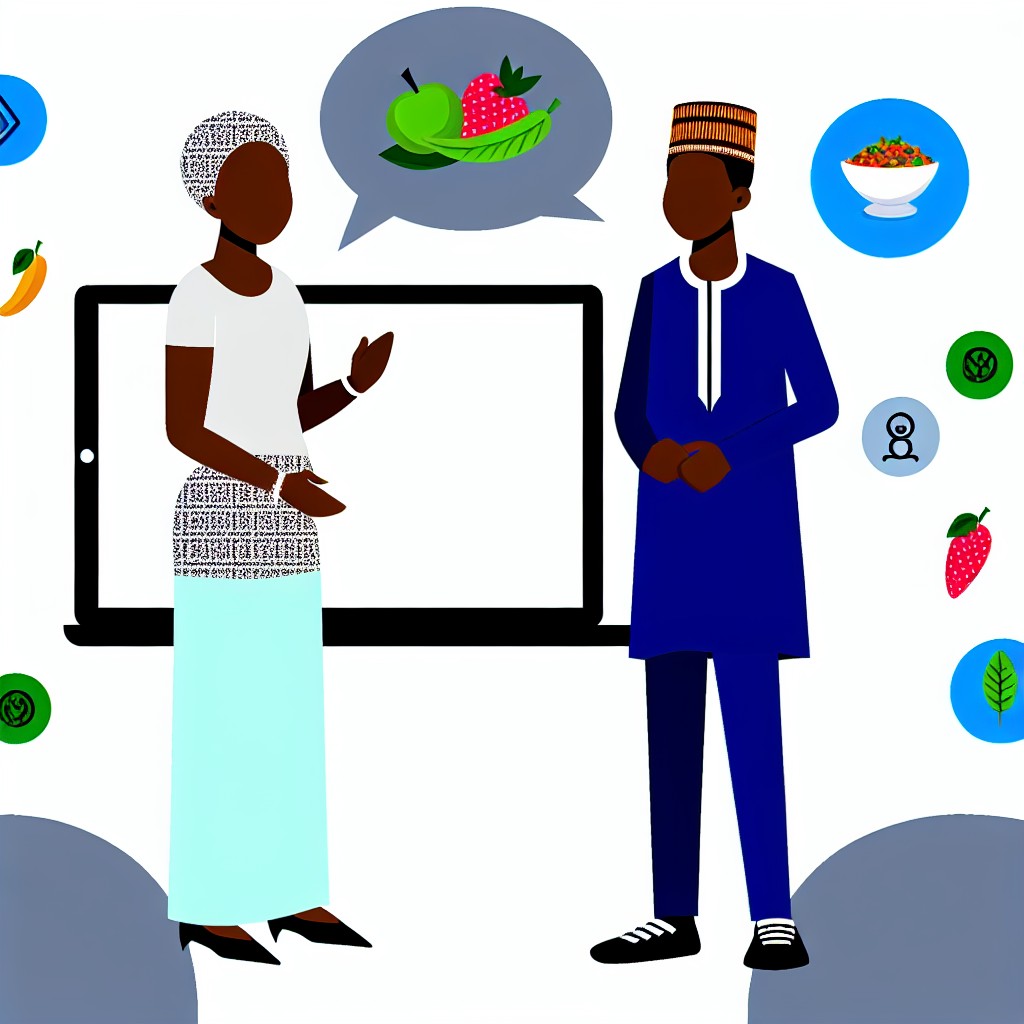Introduction
Minerals play a vital role in maintaining overall health and well-being.
They support various bodily functions important for daily life.
Boosting mineral intake is particularly important in Nigeria.
The population faces prevalent mineral deficiencies that affect health.
This blog post aims to provide daily diet plans for individuals in Nigeria.
These plans will help improve their mineral intake effectively.
Factors to Consider Before Planning a Mineral-Boosting Diet
- Different factors affect mineral intake in Nigeria.
- Cultural preferences and accessibility to certain foods play a crucial role.
- A balanced approach is needed to incorporate minerals into daily meals effectively.
When planning a diet to boost mineral intake in Nigeria, there are several factors to consider.
These factors help ensure adequate and balanced nutrition.
Understanding these factors will help individuals make informed choices.
They also promote overall health and well-being.
Availability of Foods
One key factor affecting mineral intake in Nigeria is the availability of certain foods.
Some regions may have limited access to fresh produce or mineral-rich foods.
This limitation makes meeting daily mineral requirements challenging.
It is essential to identify local sources of minerals.
Incorporate these sources into daily meals where possible.
Unlock the Power of Nigerian Food Minerals
Discover personalized Food Advisory tailored to boost your health or business using expert insights on Nigerian minerals.
Get StartedCultural Preferences
Cultural preferences play a significant role in shaping dietary habits in Nigeria.
Certain traditional dishes or cooking methods impact mineral variety and quantity.
Considering these preferences ensures diet acceptance and sustainability.
Dietary Restrictions
Individuals with dietary restrictions may face challenges in meeting mineral requirements.
Restrictions include food allergies or intolerances.
Identifying suitable alternatives and mineral sources is crucial.
This approach prevents compromising nutritional intake.
Nutrient Interactions
Some minerals interact with each other, affecting absorption.
For example, calcium and iron compete for absorption in the body.
Understanding these interactions is essential when planning a mineral diet.
This knowledge helps optimize absorption and prevent deficiencies.
Health Conditions
Certain health conditions can affect mineral absorption or use.
Conditions like celiac disease or kidney problems require specific dietary changes.
Consulting healthcare providers or dietitians can help tailor diet plans.
Captivate Your Audience with Exclusive Nigerian Food Content
Imagine your platform enriched with unique, mineral-rich Nigerian cuisine stories that no one else can offer. Let's create content that resonates deeply and sets you apart.
Get StartedThis ensures mineral needs are met effectively.
Age and Life Stage
Mineral nutrient requirements vary based on age and life stage.
Children, pregnant or lactating women, and older adults may need more minerals.
It is important to consider these needs when planning a diet.
This supports optimal growth, development, and health.
Food Preparation Methods
Food preparation can impact mineral content and bioavailability.
Cooking methods like boiling or steaming may cause nutrient loss.
Soaking or fermenting can enhance mineral absorption.
Choosing appropriate techniques helps retain and maximize nutrients.
Use of Supplements
Dietary supplements may sometimes be necessary to meet mineral requirements.
Consult a healthcare provider before starting supplements.
Excess intake of some minerals can harm health.
Supplements should complement, not replace, a balanced diet.
Considering these factors helps individuals optimize nutrition in Nigeria.
Including nutrient-dense foods and respecting cultural preferences is key.
Addressing specific needs enables a balanced and mineral-rich diet.
This supports overall health and well-being.
Mineral-Rich Foods in Nigerian Cuisine
When it comes to boosting mineral intake, Nigerian cuisine offers many options.
The foods are not only nutritious but also delicious.
Here are some traditional Nigerian foods rich in essential minerals.
- Egusi Soup: This popular Nigerian dish is made with melon seeds which are high in minerals such as magnesium and zinc.
- Jollof Rice: Jollof rice is a staple in Nigerian households and is a good source of iron, manganese, and selenium.
- Moi Moi: This steamed bean pudding is rich in copper, manganese, and phosphorus, essential minerals for the body.
For individuals with dietary restrictions or allergies, alternatives to these dishes exist.
These alternatives can still provide a significant mineral boost.
- Spinach: Substitute egusi soup with spinach, which is a great source of iron, magnesium, and calcium.
- Quinoa: Instead of jollof rice, try quinoa, a mineral-rich grain containing iron, magnesium, and zinc.
- Lentil Soup: For moi moi, consider lentil soup as a mineral-packed alternative high in copper and manganese.
Incorporate these mineral-rich foods into your daily diet.
You can meet your body’s mineral requirements effectively.
Enjoy the diverse and flavorful cuisine that Nigeria has to offer.
Learn More: Balanced Meal Plans for Nigerians’ Mineral Needs
Sample Daily Diet Plan for Boosting Mineral Intake
Breakfast
- Option 1: Oatmeal topped with sliced bananas and almonds.
- Option 2: Greek yogurt with mixed berries and chia seeds.
Portion sizes
- Oatmeal: 1/2 cup
- Bananas: 1 medium
- Almonds: 1/4 cup
- Greek yogurt: 1 cup
- Mixed berries: 1/2 cup
- Chia seeds: 1 tablespoon
Lunch
- Option 1: Grilled salmon with quinoa and steamed broccoli.
- Option 2: Lentil soup with a side of kale salad.
Portion sizes
- Salmon: 3 oz
- Quinoa: 1/2 cup
- Broccoli: 1 cup
- Lentil soup: 1 cup
- Kale salad: 1.5 cups
Dinner
- Option 1: Baked chicken with sweet potatoes and green beans.
- Option 2: Stir-fried tofu with brown rice and asparagus.
Portion sizes
- Chicken: 4 oz
- Sweet potatoes: 1 medium
- Green beans: 1 cup
- Tofu: 3 oz
- Brown rice: 1/2 cup
- Asparagus: 1 cup
Snacks
- Option 1: Apple slices with almond butter.
- Option 2: Carrot sticks with hummus.
Portion sizes
- Apple slices: 1 medium
- Almond butter: 1 tablespoon
- Carrot sticks: 1 cup
- Hummus: 2 tablespoons
By following this sample daily diet plan, you can ensure that you are getting a variety of mineral-rich foods in your meals.
Remember to drink plenty of water throughout the day to stay hydrated and aid in digestion.
Experiment with different combinations of foods to keep your meals interesting and delicious while boosting your mineral intake.
See Related Content: Daily Nigerian Meal Plans for Adequate Mineral Intake
Importance of Hydration in Mineral Absorption
Hydration plays a crucial role in mineral absorption in the body.
When you are well-hydrated, your cells are able to efficiently transport essential minerals.
This allows for proper absorption and utilization.
Dehydration, on the other hand, can lead to decreased mineral absorption.
It can also hinder overall health.
Correlation between Hydration and Mineral Absorption
Water is essential for the transportation of minerals in the body.
It acts as a solvent, helping to dissolve minerals and carry them to various cells and tissues.
Without an adequate intake of water, minerals may not be properly absorbed and utilized by the body.
Tips on Staying Hydrated Throughout the Day
- Carry a reusable water bottle with you wherever you go to ensure easy access to water.
- Set reminders on your phone or calendar to drink water at regular intervals throughout the day.
- Add natural flavorings like lemon, cucumber, or mint to your water to make it more enjoyable.
- Drink a glass of water before each meal to promote hydration and aid in digestion.
- Aim to drink at least 8-10 glasses of water per day to stay adequately hydrated.
- Monitor the color of your urine – a pale yellow color indicates proper hydration.
Water-Rich Fruits and Vegetables that Aid Mineral Absorption
- Cucumbers: With a water content of over 95%, cucumbers are a hydrating and refreshing snack that can aid in mineral absorption.
- Watermelon: This juicy fruit is not only delicious but also packed with water, making it a great choice for staying hydrated and boosting mineral intake.
- Strawberries: These vibrant berries are not only rich in antioxidants but also contain a significant amount of water to support hydration and mineral absorption.
- Spinach: Leafy greens like spinach are not only a good source of minerals but also contain water to promote hydration in the body.
- Zucchini: This versatile vegetable has a high water content, making it a hydrating addition to your meals to support mineral absorption.
- Oranges: Besides being a good source of vitamin C, oranges are also rich in water, aiding in hydration and mineral absorption.
By prioritizing hydration and incorporating water-rich fruits and vegetables into your daily diet, you can support optimal mineral absorption and overall health.
Remember to stay hydrated throughout the day and choose foods that will help you meet your mineral needs.
You Might Also Like: Nigerian Diet Plans to Meet Daily Mineral Requirements

Meal Preparation Tips for Retaining Mineral Content
- Consider steaming vegetables to retain their mineral content.
- Grilling meat can help preserve minerals while adding flavor.
- Roasting nuts and seeds is a great way to maintain their mineral content.
When it comes to meal preparation, the way you cook your food can greatly impact the mineral content.
By choosing cooking methods that preserve nutrients, you can ensure that you are getting the most out of your meals.
Benefits of Steaming, Grilling, and Roasting
Steaming is a gentle cooking method that helps retain the minerals in vegetables.
By steaming vegetables instead of boiling them, you can prevent the loss of water-soluble vitamins and minerals.
Steaming also helps to preserve the natural color and flavor of the vegetables, making them more appealing to eat.
Grilling is another healthy cooking method that can help retain minerals in your food.
When you grill meat, the fat drips away, reducing the calorie content of the food.
Grilling enhances the flavor of meats without the need for excess fats, oils, or salt.
This method also helps to retain the texture and juiciness of the meat while preserving its mineral content.
Rather than frying foods in oil, try roasting them in the oven.
Roasting nuts and seeds can help enhance their flavor while maintaining their mineral content.
This cooking method can also add a crunchy texture to nuts and seeds, making them an enjoyable snack or addition to salads and other dishes.
Storage Tips to Maintain Freshness and Nutrient Value
Proper storage of ingredients is essential for maintaining their freshness and nutrient content.
Here are some tips to help you make the most of your ingredients:
- Store fruits and vegetables in the refrigerator to preserve their freshness and prevent spoilage.
- Keep nuts and seeds in airtight containers in a cool, dark place to prevent them from becoming rancid.
- Store grains and legumes in airtight containers in a cool, dry place to prevent moisture and pests.
- Freeze meats and fish in portion-sized packages to maintain their quality and prevent freezer burn.
- Avoid storing foods in plastic containers, as they can leach chemicals into the food over time.
Instead, opt for glass or stainless steel containers.
By following these meal preparation tips and storage suggestions, you can ensure that you are getting the most out of your daily diet plans for boosting mineral intake in Nigeria.
With the right cooking methods and storage practices, you can enjoy nutrient-rich meals that support your overall health and well-being.
Find Out More: Optimizing Mineral Intake with Nigerian Diet Plans
Supplementing Minerals in Daily Diets
- Supplements play a crucial role in meeting daily mineral requirements for optimal health.
- In Nigeria, common mineral deficiencies include iron, zinc, calcium, and vitamin D.
- Supplementation is essential to bridge the gap between nutrient intake and requirements.
Role of Supplements in Meeting Daily Mineral Requirements
- Inadequate mineral intake can lead to various health issues like anemia, weakened immunity, and bone disorders.
- Supplements provide an easy and convenient way to ensure adequate mineral intake.
- They can help address specific deficiencies or support overall health and well-being.
Common Mineral Deficiencies in Nigeria
- Iron deficiency is prevalent among women and children in Nigeria, leading to anemia.
- Zinc deficiency is common due to poor dietary intake, resulting in growth stunting and impaired immunity.
- Calcium and vitamin D deficiencies are widespread, affecting bone health and overall well-being.
Significance of Mineral Supplementation
- Supplements can help prevent and manage mineral deficiencies, reducing the risk of associated health problems.
- They are particularly beneficial for vulnerable populations like pregnant women, children, and the elderly.
- Supplementation can complement a balanced diet and lifestyle to support overall health.
Guidelines for Safe and Effective Mineral Supplementation
- Consult a healthcare provider or nutritionist to determine your specific mineral needs.
- Choose high-quality supplements from reputable brands to ensure purity and effectiveness.
- Follow recommended dosages and guidelines to avoid potential side effects or toxicity.
- Consider combining supplements with whole foods rich in minerals for optimal absorption and benefits.
Enhancing Health through Mineral Supplementation and Balanced Nutrition
Supplementing minerals in daily diets is essential for maintaining good health and preventing deficiencies.
By understanding the role of supplements, common deficiencies, and recommendations for safe use, individuals can enhance their mineral intake and overall well-being.
Prioritize a balanced diet, healthy lifestyle, and regular monitoring of mineral levels to optimize health outcomes.
Enhancing Mineral Intake for Improved Health in Nigerian Diets
Boosting mineral intake in Nigerian diets is crucial for overall health and well-being.
Incorporating a variety of nutrient-dense foods rich in essential minerals helps individuals meet their daily requirements.
We encourage our readers to implement the daily diet plans and tips presented in this article to optimize their mineral intake.
It is important to prioritize foods like leafy greens, nuts, seeds, beans, and whole grains.
Doing so ensures a well-rounded and balanced diet that supports mineral needs.
The long-term health benefits of a balanced diet rich in essential minerals are extensive.
Proper mineral consumption supports bone health, strengthens immune function, and increases energy levels.
Additionally, adequate mineral intake promotes overall vitality and wellbeing.
Let us make a conscious effort to prioritize mineral intake through informed food choices.
Incorporating a variety of nutrient-rich foods daily will benefit your body in the long run.
Additional Resources
Weight loss meal plans: Tips, 7-day menu, and more
Food Prices for Nutrition DataHub: global statistics on the Cost and …




